Maintaining granite countertops can be a challenging task, especially if you don’t know the proper cleaning techniques. Granite is a popular choice for kitchen and bathroom countertops because of its durability and beauty, but it requires special care to keep it looking its best. In this article, I will share some tips on how to clean and maintain granite countertops so that they stay in top condition for years to come.
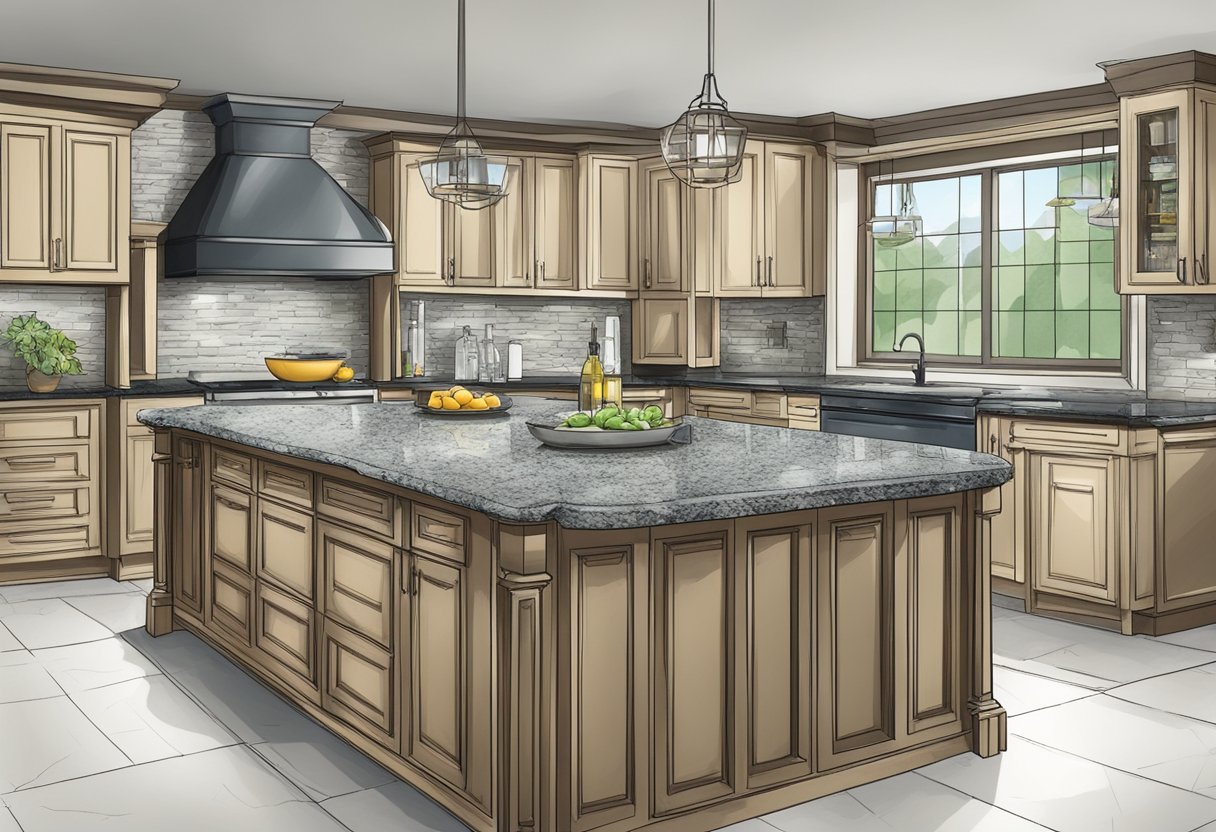
Understanding granite countertops is the first step in maintaining them. Granite is a natural stone that is porous and can be easily stained if not properly sealed. Daily cleaning is essential to prevent stains and maintain the shine of your countertops. Handling spills and stains promptly is also important to prevent them from setting in and becoming difficult to remove. Choosing the right cleaning products is crucial to prevent damage to the granite surface. In this article, I will cover all these topics and more to help you keep your granite countertops looking their best.
Key Takeaways
- Daily cleaning and prompt handling of spills and stains is essential for maintaining granite countertops.
- Choosing the right cleaning products is crucial to prevent damage to the granite surface.
- Sealing granite countertops and polishing them regularly can help maintain their beauty and durability.
Understanding Granite Countertops
https://www.youtube.com/watch?v=Taz3MesBDG4&embed=true
As someone who has installed and maintained granite countertops in my own kitchen, I can attest to their durability and beauty. Granite is a natural stone that is formed from the slow cooling of magma deep within the earth’s crust. This process results in a unique and beautiful pattern of minerals, including quartz and mica, that make each granite slab different from the next.
Granite countertops are a popular choice for kitchens and bathrooms due to their durability and resistance to scratches, heat, and stains. They are also an investment that can add value to your home. However, it is important to understand that natural stone countertops require regular maintenance to keep them looking their best.
One of the most important things to understand about granite countertops is that they are porous and can absorb liquids if left on the surface for too long. This can lead to staining and discoloration. To prevent this, it is important to wipe up spills as soon as possible and to use coasters or trivets under hot pots and pans.
Another important aspect of granite countertop maintenance is cleaning. While granite is a durable material, it is important to use the right cleaners to avoid damaging the surface. Avoid using acidic cleaners such as vinegar or lemon juice, as these can etch the surface of the stone. Instead, use a cleaner that is specifically designed for use on granite countertops, or simply use warm water and a mild dish soap.
In summary, granite countertops are a beautiful and durable investment for your home, but they require regular maintenance to keep them looking their best. By understanding the unique properties of natural stone and taking proper care of your countertops, you can enjoy their beauty and functionality for years to come.
Daily Cleaning of Granite Countertops
https://www.youtube.com/watch?v=IGigOR8LC8U&embed=true
As someone who loves cooking, I know how important it is to keep my granite countertops clean and tidy. Daily cleaning is essential in maintaining the beauty and longevity of your granite countertops. Here are some tips for daily cleaning:
- Use a microfiber cloth to remove crumbs or other debris before adding your cleaning solution.
- Combine warm water and mild dish soap. Dip a clean microfiber cloth or sponge in the mixture.
- Wipe the countertops. Make sure to wipe in circular motions to avoid streaks.
- Rinse with clean water to remove soap residue.
- Wipe the countertops dry with a clean microfiber cloth.
It’s important to use a mild dish soap and avoid harsh chemicals that can damage your granite countertops. Hot water is also effective in removing dirt and grime.
Remember to wipe your countertops dry to avoid water spots. Using a clean microfiber cloth is the best way to ensure a streak-free finish.
By following these simple steps, you can maintain the beauty and longevity of your granite countertops for years to come.
Handling Spills and Stains
https://www.youtube.com/watch?v=si3qhqduk5A&embed=true
As much as we try to avoid them, spills and stains are bound to happen on our granite countertops. But don’t worry, with a little bit of quick action and the right tools, you can easily handle any spills or stains that come your way.
When it comes to spills, the key is to wipe them up as soon as possible. This is especially important for water-based spills, as they can quickly seep into the granite and cause discoloration or staining. Simply grab a clean cloth or paper towel and blot up the spill, being careful not to spread it around.
If you’re dealing with a stain on your granite countertop, the first step is to identify whether it’s an oil-based or water-based stain. Oil-based stains are typically darker and greasy, while water-based stains are lighter and less oily. Once you’ve identified the type of stain, you can take the appropriate action.
For water-based stains, mix a paste of baking soda and hydrogen peroxide and apply it to the stain. Cover the area with plastic wrap and let it sit for several hours or overnight. Then, remove the plastic wrap and wipe away the paste with a damp cloth.
Oil-based stains can be a bit trickier to remove, but a poultice made from baking soda and water can often do the trick. Mix the baking soda and water to create a thick paste, then apply it to the stain. Cover the area with plastic wrap and let it sit for several hours or overnight. Then, remove the plastic wrap and wipe away the paste with a damp cloth.
Remember, prevention is key when it comes to spills and stains on your granite countertops. Be sure to wipe up spills as soon as they happen, and avoid placing hot or acidic items directly on the surface. With a little bit of care and attention, your granite countertops will stay looking beautiful for years to come.
Choosing the Right Cleaning Products
https://www.youtube.com/watch?v=1MGa8hQkqIc&embed=true
As a homeowner with granite countertops, it’s important to choose the right cleaning products to keep them looking their best. Here are a few tips on what to consider when selecting cleaning products for your granite countertops.
Avoid Harsh Cleaners
First and foremost, it’s important to avoid using harsh cleaners on your granite countertops. Harsh cleaners can damage the surface and cause it to lose its shine. Avoid using cleaners that contain ammonia, bleach, or other acidic substances. Instead, opt for cleaning products that are specifically designed for granite surfaces.
Use Mild Dish Soap or Granite Cleaner
For regular granite cleaning, mild dish soap diluted with water is the best cleaner. You can also use a granite cleaner that is specifically formulated for use on granite surfaces. Squirt the cleaner onto a soft sponge and wipe down the surface of your countertops. Rinse the sponge and wipe down the surface again to remove any excess cleaner.
Avoid Vinegar and Lemon Juice
While vinegar and lemon juice are natural cleaning agents, they are acidic and can damage your granite countertops. Avoid using these substances on your countertops, as they can cause etching and dull the surface.
Consider Commercial Cleaning Products
If you prefer to use commercial cleaning products, choose ones that are specifically designed for granite surfaces. Look for products that are pH-neutral and do not contain harsh chemicals. These products are gentle enough to use on your countertops without causing any damage.
Avoid Antibacterial Products
While it may be tempting to use antibacterial cleaning products on your countertops, it’s best to avoid them. Antibacterial products can contain harsh chemicals that can damage your granite surfaces. Instead, opt for mild dish soap or granite cleaner to keep your countertops clean and free of bacteria.
By following these tips, you can choose the right cleaning products for your granite countertops and keep them looking their best for years to come.
Preventing Damage to Granite Countertops
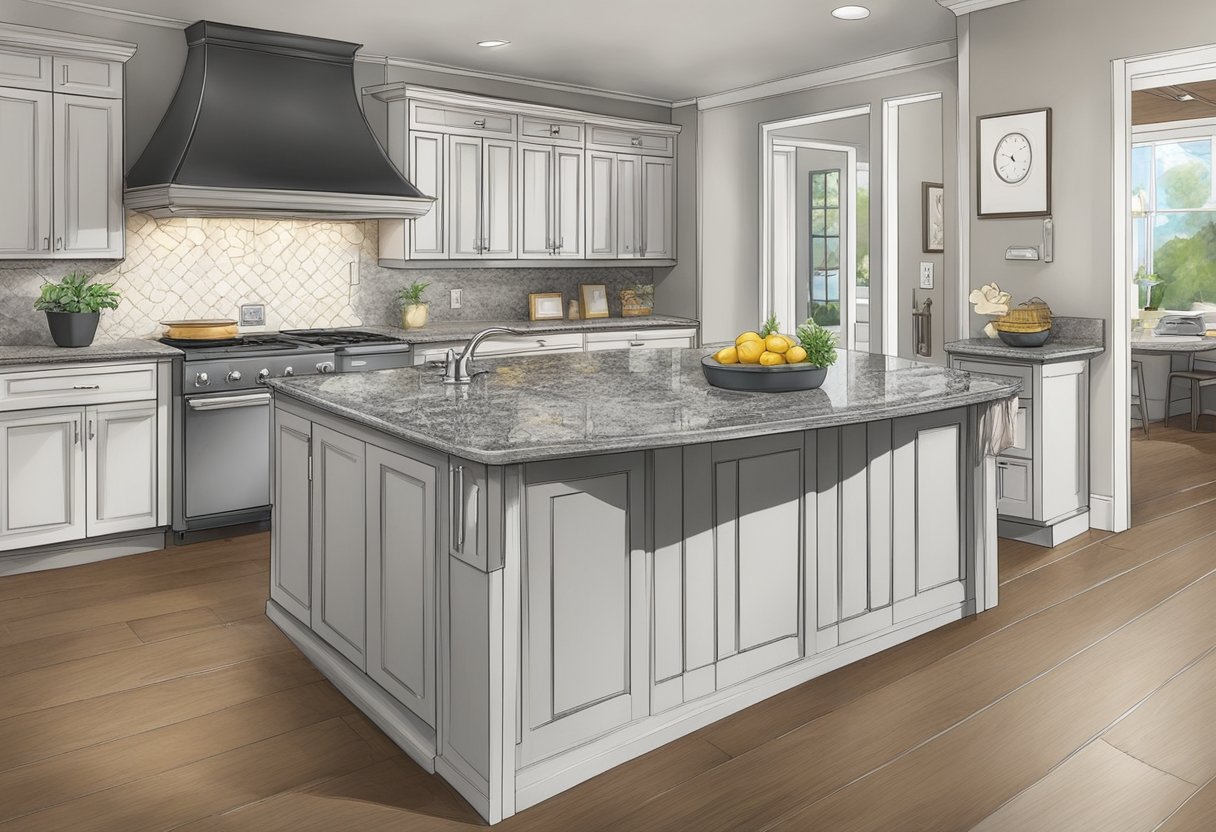
As a granite countertop owner, I know how important it is to take care of it properly to prevent damage. Here are some tips that I have found useful:
Use Coasters and Trivets
Placing hot pots and pans directly on the granite surface can cause thermal shock, which can lead to cracks or chips. To avoid this, I always use trivets or hot pads under hot dishes. Similarly, acidic liquids like vinegar, lemon juice, or wine can etch the surface of the granite, so I use coasters under glasses and bottles to prevent any spills.
Use Cutting Boards
While granite is a durable material, it can still be scratched or damaged by sharp objects like knives. To avoid this, I always use a cutting board when preparing food on my granite countertop. This not only protects the countertop but also keeps the knives sharp.
Be Cautious
I always make sure to be careful when using my granite countertop. I avoid dropping heavy objects on it and try not to lean or sit on it. By being cautious, I can prevent any accidental damage.
Repairing Granite
Despite our best efforts, sometimes damage can occur. If you notice any chips or cracks on your granite countertop, it’s important to address them immediately. There are granite repair kits available that can help you fix minor damage. However, for more significant damage, it’s best to consult a professional.
By following these preventive measures, I have been able to keep my granite countertop looking like new for years.
Sealing Granite Countertops
https://www.youtube.com/watch?v=ffUcD0erfLs&embed=true
As a granite countertop owner, it’s essential to know how to properly seal your countertop to protect it from water damage, stains, and other forms of wear and tear. Granite is a porous material, which means that it can absorb liquids and other substances that can cause damage over time.
To seal your granite countertop, you’ll need an impregnating sealer that can penetrate the pores of the stone. Before applying the sealer, make sure that your countertop is clean and dry. Use a natural stone cleaner to remove any dirt, grime, or stains that may be on the surface.
After cleaning your countertop, apply the sealer according to the manufacturer’s instructions. Some sealers require you to pour the product onto the countertop, while others come in a spray bottle. Make sure to coat your entire countertop evenly, and don’t forget to seal the edges as well.
Once you’ve applied the sealer, let it sit for 5 to 10 minutes, or until it has been absorbed by the granite. If the sealer absorbs within 5 minutes, apply an additional coat. After 10 minutes, wipe off any excess sealer with a clean, dry cloth.
It’s important to note that you’ll need to reseal your granite countertop every 6 to 12 months, depending on how often you use it. You can test whether your countertop needs to be resealed by pouring a small amount of water on an inconspicuous area and letting it sit for 15 minutes. If the water beads up, your countertop is still protected. If the water is absorbed into the granite, it’s time to reseal.
By properly sealing your granite countertop, you’ll be able to keep it looking beautiful for years to come. Remember to clean your countertop regularly with a natural stone cleaner and avoid using harsh chemicals that can damage the sealant. With proper care and maintenance, your granite countertop will remain a stunning focal point in your kitchen or bathroom.
Polishing and Disinfecting Granite Countertops
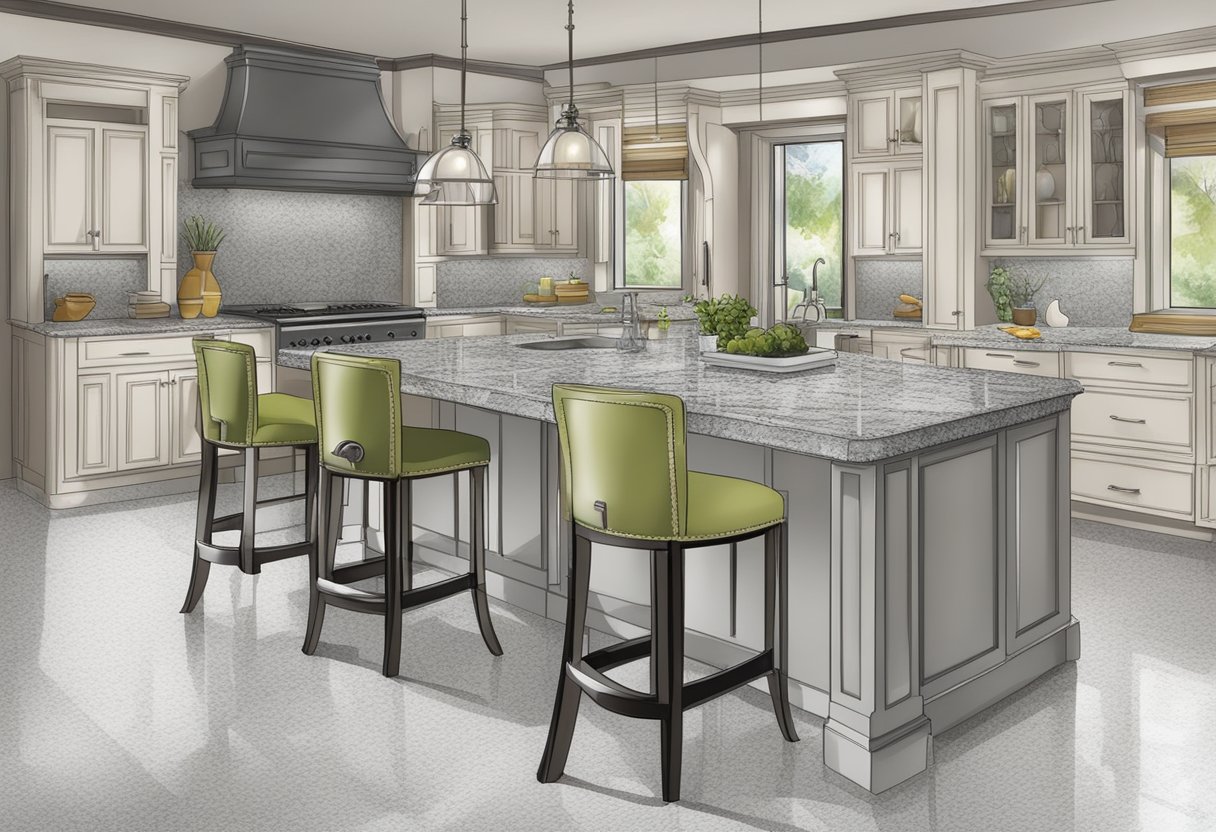
Maintaining the shine and cleanliness of granite countertops is important to keep them looking new and appealing. Here are some tips on how to polish and disinfect granite countertops.
Polishing Granite Countertops
To restore the shine of granite countertops, I use a granite polish that is specifically designed for this purpose. I apply the polish using a soft cloth and buff it in a circular motion. It is important to follow the instructions on the polish and not to use too much of it, as this can leave a residue.
Another way to polish granite countertops is to use a mixture of warm water and rubbing alcohol. I mix equal parts of water and alcohol in a spray bottle and spray the solution on the countertop. Then, I use a soft cloth to buff the countertop in a circular motion. This method is effective in removing streaks and leaving the countertop shiny.
Disinfecting Granite Countertops
To disinfect granite countertops, I use a mixture of hot water and dish soap. I mix a few drops of dish soap in a bowl of hot water and use a soft cloth to wipe down the countertop. Then, I rinse the countertop with clean water and dry it with a soft cloth.
For a more thorough disinfection, I use an antibacterial spray that is safe for granite countertops. I spray the solution on the countertop and let it sit for a few minutes before wiping it off with a soft cloth. It is important to read the instructions on the spray and not to use too much of it, as this can damage the countertop.
In conclusion, polishing and disinfecting granite countertops is easy and essential for maintaining their beauty and hygiene. By following these tips, I can keep my granite countertops looking new and clean for years to come.
Additional Care for Granite Floors and Backsplashes
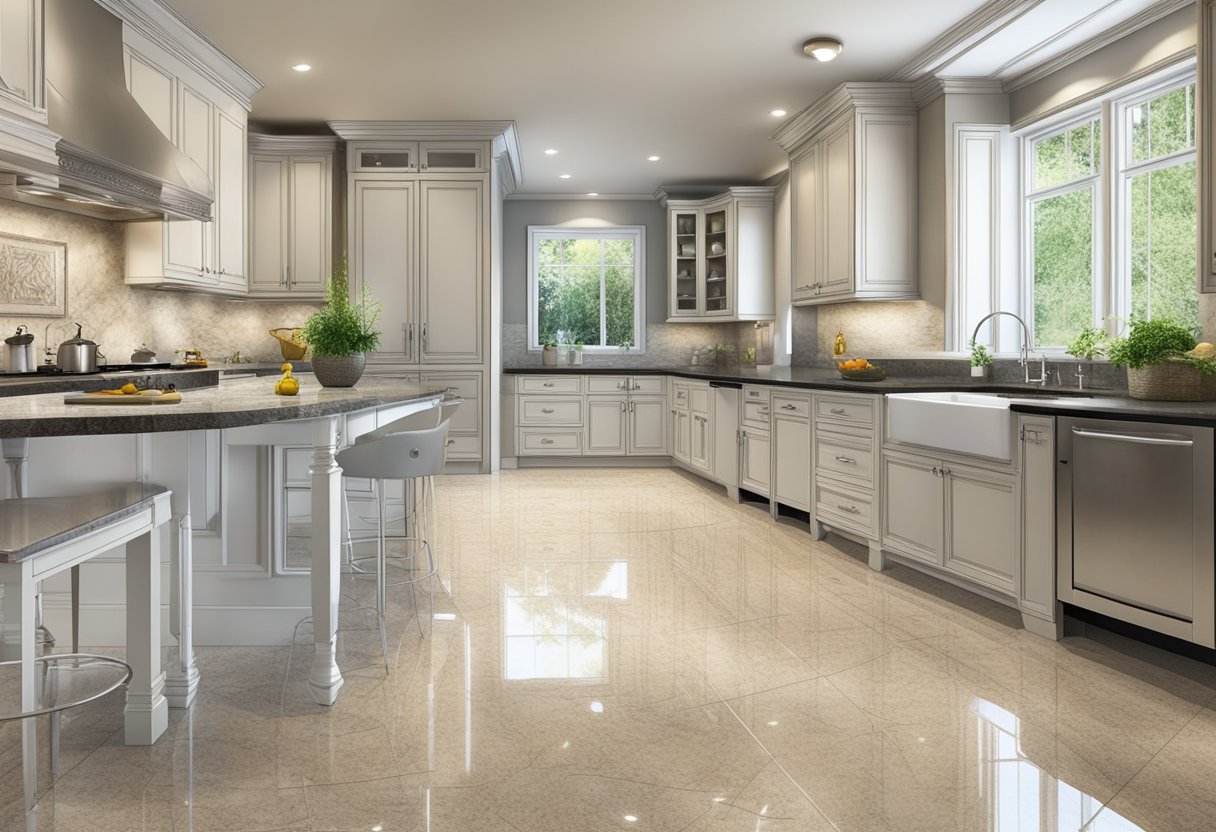
Maintaining granite floors and backsplashes requires some additional care compared to granite countertops. Here are some tips for keeping your granite floors and backsplashes looking their best:
1. Sweep and Mop Regularly
Sweeping and mopping your granite floors regularly is essential for keeping them clean and free of dirt and debris. Use a soft-bristled broom or vacuum cleaner to remove dirt and dust from the surface, and then mop with a gentle cleaner made for stone floors.
2. Avoid Harsh Cleaners
When cleaning your granite floors and backsplashes, avoid using harsh cleaners that can damage the surface. Instead, opt for a mild, pH-neutral cleaner that is specifically formulated for use on stone surfaces.
3. Wipe Up Spills Immediately
Spills on granite floors and backsplashes can lead to stains if left unattended. To prevent stains, wipe up spills immediately with a soft cloth or paper towel.
4. Use Mats and Rugs
Placing mats and rugs in high-traffic areas of your home can help protect your granite floors from scratches and wear. Be sure to choose mats and rugs with non-slip backings to prevent slips and falls.
5. Seal Your Floors and Backsplashes
Sealing your granite floors and backsplashes can help protect them from stains and damage. Be sure to follow the manufacturer’s instructions for sealing your particular type of granite.
By following these simple tips, you can keep your granite floors and backsplashes looking beautiful for years to come.
Frequently Asked Questions
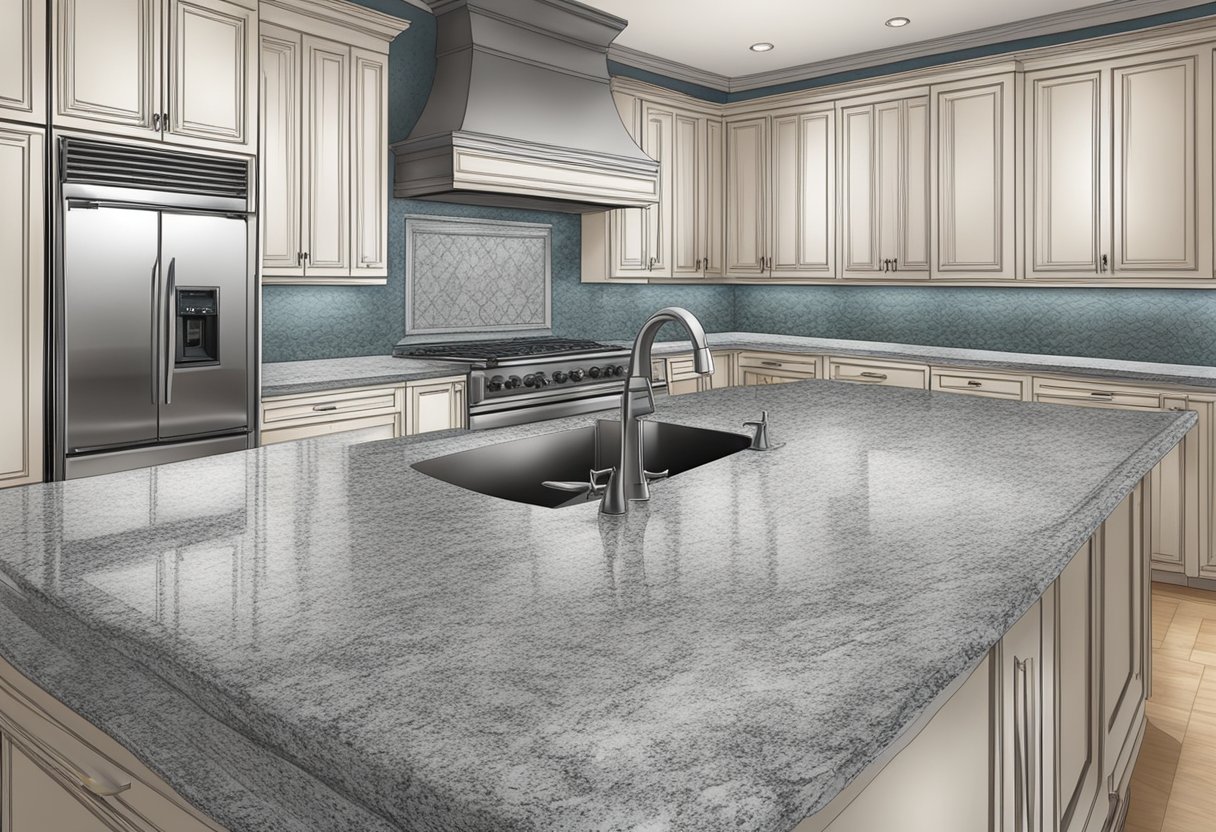
What are some do’s and don’ts of cleaning granite countertops?
When it comes to cleaning granite countertops, there are some things you should and shouldn’t do. Here are some do’s and don’ts to keep in mind:
Do:
- Clean up spills as soon as they happen.
- Use a pH-neutral cleaner specifically designed for granite.
- Use a soft cloth or sponge to clean the surface.
- Dry the countertop thoroughly after cleaning.
Don’t:
- Use abrasive cleaners or scrubbers.
- Use vinegar, lemon juice, or other acidic cleaners.
- Use ammonia or bleach-based cleaners.
- Place hot pans or pots directly on the countertop.
How often do you need to seal granite countertops?
Granite countertops should be sealed regularly to protect them from stains and damage. How often you need to seal your countertops depends on the type of granite and how often you use your countertops. As a general rule, you should seal your countertops once a year.
What is the best thing to clean granite countertops with?
The best thing to clean granite countertops with is a pH-neutral cleaner specifically designed for granite. You can also use warm water and a mild dish soap. Avoid using vinegar, lemon juice, or other acidic cleaners, as well as abrasive cleaners or scrubbers.
What should you not put on a granite countertop?
There are some things you should avoid putting on your granite countertop to prevent damage. Here are some items to avoid:
- Hot pans or pots directly on the countertop.
- Acidic or abrasive cleaners.
- Cutting directly on the countertop without a cutting board.
- Standing water or spills for extended periods.
How can you clean black granite countertops?
Cleaning black granite countertops is similar to cleaning other types of granite countertops. Use a pH-neutral cleaner specifically designed for granite or warm water and a mild dish soap. Avoid using abrasive cleaners or scrubbers, as well as vinegar, lemon juice, or other acidic cleaners.
How can you make granite countertops shine naturally?
To make granite countertops shine naturally, first, clean the surface with a pH-neutral cleaner specifically designed for granite or warm water and a mild dish soap. Then, dry the surface thoroughly. You can also use a granite polish to give your countertops an extra shine.
